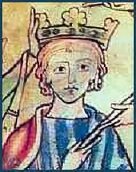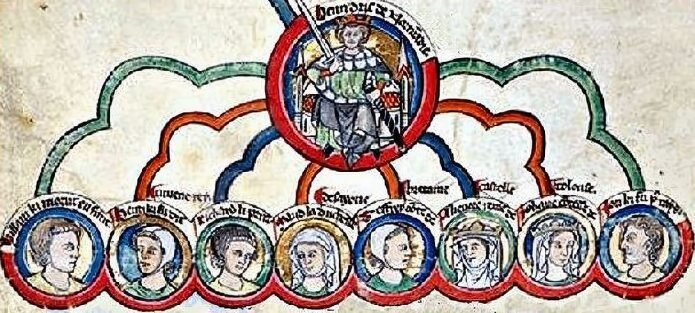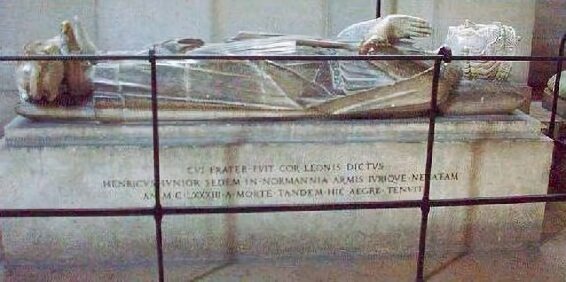1155 - 1183
Henry Plantagenet, the Young King was born on 28 February 1155 and was the eldest surviving son of King Henry II and Eleanor of Aquitaine. An elder brother, William, Count of Poitiers, who should have been his father's heir, had been born in Normandy, over a year before Henry on 17 August 1153, but died of a seizure at Wallingford Castle in April 1156 and was buried in Reading Abbey at the feet of his great-grandfather Henry I.
Henry, the Young King
Henry was described by contemporaries as a charming youth of striking beauty, tall, well proportioned and broad-shouldered, pale freckled skin, bright and blue eyes and the reddish-gold hair characteristic of the Plantagenet family. He was sent to live in the household of Thomas Becket, with whom he formed a strong attachment. The young Henry was reported to have said Becket showed him more fatherly love in a day than his father did for his entire life.
At Montmirail in Maine in January 1169 King Henry II announced his intentions for the division of his vast dominions. The Young Henry, as his eldest son, was to receive England, Normandy, and Anjou, while Richard, the second surviving son was to inherit his mother's Duchy of Aquitaine. At the age of fifteen, during his father's lifetime, Henry was crowned King of England in June, 1170, to avoid a disputed succession. On 27 August 1172, he was married to Margaret of France, daughter of King Louis VII of France and his second wife, Constance of Castile, the couple had been betrothed since their infancy, in an an attempt to finally settle the quarel between the Counts of Anjou and the Kings of France over possession of the frontier district of the Norman Vexin, which Louis VII had acquired from Henry II's father, Geoffrey Plantagenet, Count of Anjou.
The children of Henry II
By the terms of the marriage agreement, Margaret would bring the castles of the Norman Vexin to her new husband. Henry II took advantage of Pope Alexander III's political difficulties to secure the Pope's permission for the children to be married. The marriage was hurried through by the acquisitive Henry II, he then characteristically seized the castles, resulting in a bitter border war between the two kings.
The marriage had been officiated by Archbishop Roger of York, who in doing so usurped a prerogative of the exiled Thomas Becket, Archbishop of Canterbury, which exacerbated the dispute between Becket and Henry II, which culminated with the murder of Becket at Canterbury Cathedral six months later.
At the marriage, Henry was crowned king of England a second time, this time together with Margaret of France. One child was born of the marriage, a son, named William, in 1177. The child arrived prematurely and died shortly afterwards.
The newly crowned young King possessed a passion for tournaments, spending much of his adult life travelling between tournaments, achieving fame and renown in the process. His friend and mentor through his early days was William Marshal, a former tutor, but his lack of power and lands still rankled and frustrated him and in 1173, only a year after his second coronation, he rebelled against his father.
Henry, "A restless youth born for the undoing of many", was dissatisfied, he possessed grand titles but no real power. When King Henry II tried to negotiate a marriage for his youngest son, John, the prospective father-in-law asked that John be given some property. The King responded by granting John three castles in Anjou. The young Henry promptly objected and demanded either England, Normandy or Anjou to rule in his own right and fled to the French court. Led on by his father-in-law, the King of France, who had his axe to grind, young Henry openly rebelled against his father. He was joined at the court of France by his equally turbulent brothers, Richard, Duke of Aquitaine and Geoffrey, now Duke of Brittany since his marriage to the heiress Constance of Brittany.
Tomb of Henry, the Young King at Rouen Cathedral
Further disputes arose between young Henry and his equally fiery-tempered brother, Richard. (The future Richard I 'the Lionheart') The Young King objected to a castle Richard had built on what he claimed to be his territory. Henry, aided by his brother Geoffrey, attempted to subdue Richard and the affair provided a further excuse to rebel against their father. Richard allied himself with their father. The Young King began to ravage Aquitaine.
The Young King plundered the rich shrine of Rocamadour, after which he fell mortally ill of dysentery. When he knew death was inevitable, he asked his followers to lay him on a bed of ashes spread on the floor as a sign of repentance and begged his father to forgive and visit him, since he had taken a crusader's vow which he was now unable to fulfil, he gave his cloak to his friend William Marshal with the plea that he should take the cloak to the Holy Sepulchre in Jerusalem.
The King, who suspected a trap, refused to visit his son but sent a sapphire ring, once owned by his grandfather Henry I, to the young Henry as a sign of his forgiveness. A few days later the Young King was dead, Henry and Eleanor mourned the loss of their errant son sincerely.
Henry had left instructions that his entrails and other body parts should be buried at the abbey of Charroux, but the rest of his body should lie at Rouen Cathedral, where his tomb is situated on the opposite side of the altar from the tomb of his younger brother, Richard the Lionheart. The Young King popularity was such that Le Mans and Rouen quarrelled bitterly for the custody of his body, and in Aquitaine, he was immortalized in the 'Lament for the Young King' by the troubadour Bertran de Born. These views, however, were not shared by all, Walter Map, a clerk at the court of Henry II, wrote soon after the young king's death -" ''Truly, he left nothing unprobed, no stone unturned; he befouled the whole world with his treasons, a prodigy of unfaith and prodigal of ill, a limpid spring of wickedness, the attractive tinder of villainy, a lovely place of sin. the originator of the heresy of traitors. a false son to his father. the peaceful king'.
Eleanor of Aquitaine PreviousNext Thomas Becket
